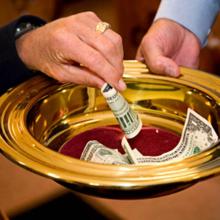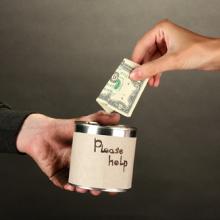donations
Overall, giving to religious causes amounted to close to a third of all charitable giving in 2016, Giving USA says. Religious institutions received $122.94 billion that year, or 32 percent of charitable donations. That figure is more than double the amount received by educational institutions, the next highest sector within nonprofits, which garnered $59.77 billion.
AS ICE CREAM entrepreneurs, Jerry and I have been on a journey that has led us squarely to the conclusion that, while there are many ways that a business can use its power to improve people’s quality of life, the most effective lever for economic and social justice is the government.
Business can use its voice to influence government for good. But too often big corporations use the system of unlimited political “donations”—a system that John McCain calls “legalized bribery”—to skew the government in favor of their own narrow self-interest. That’s why I’m devoting my time and treasure to hacking at a root cause of injustice: big money in politics and crony capitalism.
A nationwide poll of small-business owners commissioned by Small Business Majority found more than three-fourths (77 percent) of small employers say big businesses have a significant impact on government decisions and the political process, whereas a mere 24 percent say small businesses have a significant impact on the process.
While there are no biblical texts speaking directly to the issue of money in politics, biblical principles are still relevant, and people of faith have an important role to play in the emerging debate about the future of our democracy. Before exploring those principles, however, it is important to understand the serious issues of inequality currently present in our system, and the correlation between inequality and the money flooding our political system.
The richest 1 percent own more of the nation’s wealth than the bottom 90 percent. The richest one-tenth of one percent have as much pre-tax income as the bottom 120 million Americans.
In Affluence and Influence, political scientist Martin Gilens concludes that, “The preferences of the vast majority of Americans appear to have essentially no impact on which politics the government does or does not adapt.” He details the data throughout his book that clearly demonstrates policy makers are only listening to the wealthy donor class. This situation has been made even worse by the Supreme Court’sCitizens United in 2010, which allowed a huge influx of money to flood our political system after declaring the personhood of corporations.
The Court’s more recent decision in McCutcheon v FEC made matters even worse. Before McCutcheon, one person was able to contribute up to $123,000 to political candidates and parties. In striking down this aggregate limit, the Court paved the way for individuals to contribute more than $3.5 million directly to candidates and party committees. In a report detailing the potential impact of McCutcheon, Demos predicts the decision could result in more than $1 billion in additional campaign contributions by 2020.
When it comes to donating to charity, Britain’s small but fast-growing Muslim community comes out ahead of other religious groups, a recent survey shows.
Conducted by ICM, a London-based polling agency, the survey shows the U.K.’s estimated 280,000 Muslims report giving more money annually to charity than Christians, Hindus, Sikhs, and Jews.
The survey, conducted on behalf of JustGiving, an online giving platform, also found a 70 percent rise in giving over the past two years from among Muslims to the charity-giving site.
A small Minnesota church is finding out the high cost of standing up for same-sex equality — as well as an unexpected lifeline from the very people it decided to support.
When the Rev. Oliver White voted in favor of the United Church of Christ's endorsement of same-sex marriage in 2005, 72 percent of his predominantly African-American flock at Grace Community United Church in St. Paul couldn't stand with him.
The UCC's 2005 vote, he said, was "the beginning of the end of many UCC churches." Predominantly black churches like his suffered the most, he said, because the black community "was, and still is, very homophobic."
Because of White's vote, his church developed a reputation of being a "gay church" and people stopped coming. And stopped giving.
Some sources have stated that more than 12 million people are being impacted by the worst drought and famine in the region of the Horn of Africa in 60 years.
12 million people.
How do you wrap your head around such a number?
12,000,000
You begin with one.
The World Food Programme, for example, has shared that they can provide a nutritious meal for one person for .17



